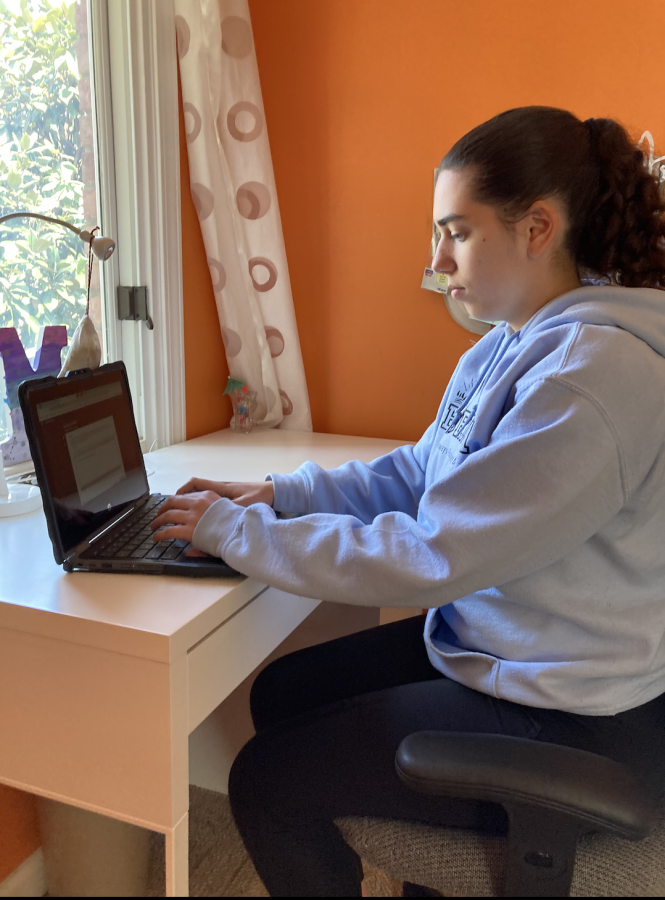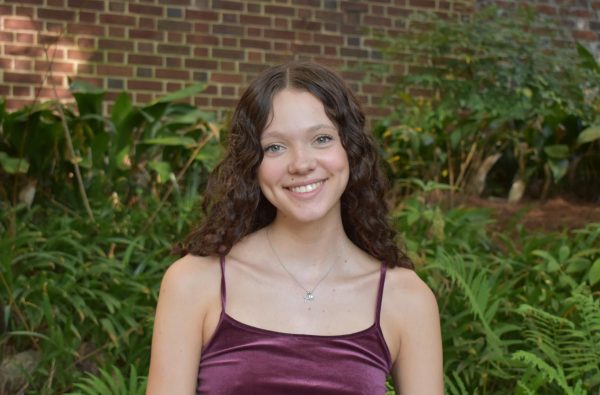Students balance virtual and in-person classes as school year comes to an end
Freshman Talia Pivoshenko working on Atlanta Virtual Academy (AVA) to finish her health classwork.
May 17, 2022
When some students want to get ahead in school they find Atlanta Virtual Academy (AVA) or Georgia Virtual School (GVS). This [institution] or something similar gives these students an opportunity to accelerate their education on their own time. However, some find work can start to pile up, leading them to a stressful situation.
AVA provides a rigorous and thorough education that replicates the education any student can obtain in in-person schooling and GVS works with schools to provide teaching all across the state. Students can acquire credits they need to graduate, use it as a tool to be in an advanced class for their grade level, or even use it as a resource to get their full schooling.
“I think GVS is a great way to take courses that aren’t offered at Midtown or ones you want to take for extra credit,” Freshman GVS student Kate Rebillot said. “The courses can be a bit much sometimes, but if you stay on top of your work, it will pay off.”
The persistence needed to get through virtual school can be seen as being similar to that of in-person, but seeing assignments accumulate and stress build, it can get tough to get past, especially with the fear of failing the class on their shoulders.
“It definitely takes a good amount of determination for me to finish everything, but then I remind myself that I’d probably have close to the same amount of work if I took the class in person,” Rebillot said.
While virtual learning is a great outlet for students to further their education it comes with cons that can affect in-person grades negatively.
“My problem is that I just have so much more work in school, and AVA just adds to it,” Freshman GVS student Talia Pivoshenko said. “I think of this as something extra that I want to do, just to get rid of a required credit, so, I put my schoolwork from Midtown first. But when I have time, I try to do it as much as I can and it can get stressful.”
Freshman GVS Student Lila Duke said the workload can become overwhelming since all assignments given are graded.
“The workload seems a little more than in-person because everything’s homework instead of some things being classwork or ungraded work,” Duke said.
In addition to work being taxing, the pacing strategy used can be particularly burdensome.
“I can get ahead, as far as I want to,” Pivoshenko said. “There is a pacing guideline that they recommend to stick with that I try to keep up with, but I do tend to get behind on my work when I have all my work laid out in front of me.”
Both students say that encouraging themselves to do the work can get tough.
“Sometimes motivation is hard and I tend to put things off for too long, but I get most of my work done before due dates,” Duke said.
Despite the negatives of virtual school, such as excess work and pressure, Pivoshenko says it’s a good way to get ahead.
“I feel it’s [virtual school] a good way to take something that you either are required to take or if you want to be in an advanced class the next year,” Pivoshenko said.
Now that school has gone back to in-person learning, virtual school is used as an added measure for students who want to excel and according to Rebillot, pays off significantly.
“I started GVS to take Algebra 1 last year, and I am currently continuing the pathway with Algebra 2,” Rebillot said. “I have to take Accelerated Pre-calculus next year online, but the following year I’ll be able to take math in school again. I decided to take the class via GVS when Howard, formerly Inman, stopped offering it and I wanted to stay on the accelerated math pathway.”
Although AVA and GVS can be hard to maintain for some, the support received from certified teachers helps students achieve much-needed free time.
“Overall, I would recommend it because it’s nice to be self-paced and have more freedom in my schedule during the school year,” Duke said.







